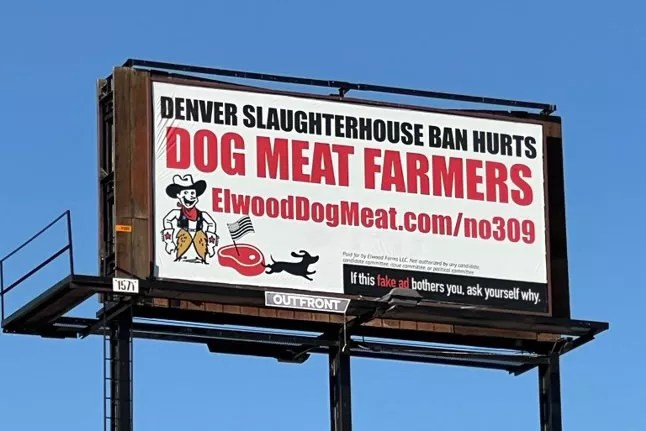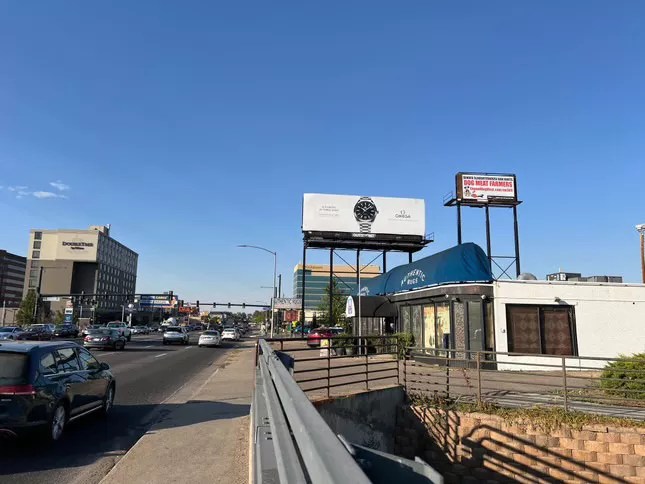
Courtesy Molly Elwood

Audio By Carbonatix
Denver residents driving down South Colorado Boulevard this month will be met with an even more controversial sight than Shotgun Willie’s strip club or the Fascinations sex shop.
In bold black and red letters, a billboard posted near the intersection at East Virginia Avenue reads, “Denver slaughterhouse ban hurts dog meat farmers,” with illustrations of a wiener dog running from a piece of steak. In much smaller letters at the bottom, it says, “If this fake ad bothers you, ask yourself why.”
The billboard, erected on October 8, came from Oregon-based vegan activist Molly Elwood. She’s run advertisements for her satirical Elwood’s Organic Dog Meat company in Florida, Illinois, Nevada and even the United Kingdom. She says a local college student asked her to make a billboard in Denver inspired by Initiated Ordinance 309, a ballot measure seeking to prohibit slaughterhouses within the city.
“I’m hoping to bring attention to the blockers we have around the way we talk about animals and the way we justify how we treat them,” Elwood says. “If you just swap in the word ‘dog’…suddenly it is horrific. You would never be okay with this with dogs. None of the excuses would matter; it wouldn’t matter if it was jobs or tradition or it tastes good.”
Elwood registered her work in support of Ordinance 309 but says she is not affiliated with the Ordinance 309 campaign or Pro-Animal Future, the group leading the ballot measure. She spent $4,000 on the billboard, all of which came from the Karuna Foundation, a Colorado nonprofit that funds vegan activism, according to city campaign finance records.
Ian Silverii, spokesperson for the opposition campaign fighting the slaughterhouse ban, says they are “entirely unamused” by the billboard.
“This appears to be some kind of inside joke among the out-of-state activists pushing to shut down this one employee-owned business and send its 160 workers to the unemployment lines,” Silverii says, “but we don’t find this weird billboard or anything about their campaign to be particularly funny. I guess their sense of humor is about as in tune with Denver as the rest of their tone-deaf campaign.”
Superior Farms is the only slaughterhouse in Denver that will be impacted by the ban if passed by voters in November. The Globeville facility is the largest lamb-packing plant in the country, accounting for 15 to 20 percent of lamb slaughter capacity in the United States, and responsible for Colorado being the third-largest producer of sheep and lambs in the nation.
The billboard is the latest addition to a contentious ballot battle surrounding the proposed slaughterhouse ban, which has included accusations of campaign finance violations against the support campaign and fines from the U.S. Environmental Protection Agency against Superior Farms.
Elwood says her advertisements are intended to make people confront the explanations they use for eating meat by applying them to man’s best friend: “As they’re arguing with me, I make all the anti-vegan arguments,” she explains. “I get to say, ‘Well, it’s local, so it’s fine. We’re a family farm, so it’s fine. The dogs are free-range, they have access to pastures, doesn’t that make it okay?’ And everybody realizes that’s not enough, and it doesn’t matter.”

The billboard will be posted on South Colorado Boulevard near East Virginia Avenue throughout October.
Courtesy Molly Elwood
She targeted language from the Ordinance 309 opposition campaign in a press release for the Denver billboard, sarcastically lamenting “groups deciding what you can and can’t eat – starting with dog meat” and “ignoring the livelihoods of dog meat farmers and the centuries-old tradition of raising dogs for food.”
“You’re making people go through a vegan experience,” Elwood says. “You’re supposed to go on this journey of first being outraged and then going, ‘Ah, I get what they’re doing.’ And then you’re stuck thinking about it. You’re going to come up with all these reasons for why dogs are different, but if they were raised for [slaughter], what’s the difference?”
Elwood’s Organic Dog Meat project started with a few bumper stickers in July 2021. Since then, she’s launched faux dog meat farms under different names in Brazil, Finland, France, Germany, Netherlands, Norway and Spain. The group has accumulated over 100,000 followers across its social media accounts and holds various in-person events, including “DIY dog harvests” inspired by chicken harvests, “guided dog hunts” based on coyote hunts, and “dog meat tastings” at college campuses.
Elwood says she regularly gets death threats from people who think her dog meat farm is real. But inspiring outrage is exactly the point – she just wants to re-direct it toward actual farming operations.
So far, all of the emails and calls she’s received about the Denver billboard have been from confused residents (and one reporter) asking if the dog farm is real, Elwood says. The billboard will remain up for the rest of October. She hopes it will incline voters to reconsider their views on slaughterhouses ahead of Election Day on November 5.
“How do you feel about this idea when it’s actually presented to you?” Elwood asks. “If there were a dog slaughterhouse, you would want to stop it. You would do everything possible.”